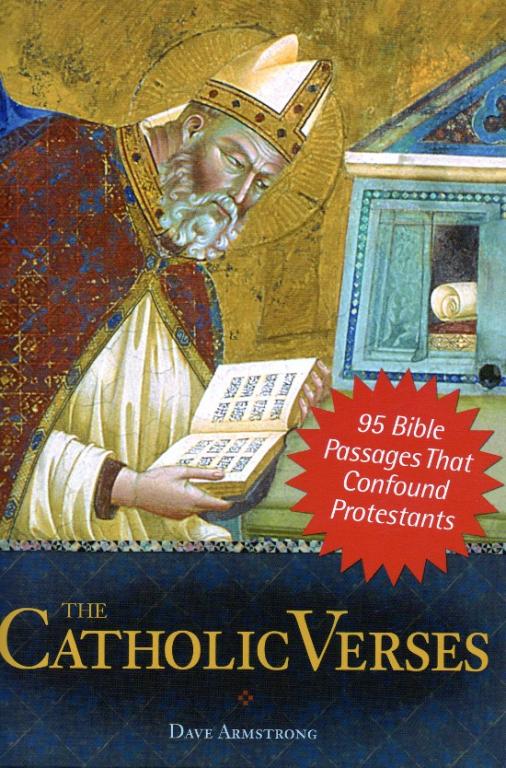
(2004)
***
[from pages 205-214 (the complete chapter 14) of my book, The Catholic Verses; Bible verses: RSV]
***
See related papers:
Matthew 19:9 “Divorce Exception” Translation Bias [11-6-08]
Biblical Evidence for Annulments [2002]
Annulment is Not “Catholic Divorce” [11-17-15]
Divorce: Early Church Teaching [Oct. 1998]
OUR LORD JESUS’ “STRICT” STANCE ON DIVORCE
Matthew 19:9: “And I say to you: whoever divorces his wife, except for unchastity, and marries another, commits adultery.”
The Catholic teaching on this passage and on the question of marriage and divorce in general can be summarized as follows: a valid sacramental marriage is indissoluble; that is, it cannot be undone as long as both spouses are alive According to Matthew 19:6, the spouses “are no longer two but one flesh. What therefore God has joined together, let not man put asunder.”
Nearly all Protestant churches today, although typically frowning upon divorce, allow exceptions for adultery or abandonment or similarly serious marital difficulties. The traditional stigma of divorce has lessened greatly in Protestant circles just as it has in the secular culture, and divorce is permitted under more and more circumstances. This has been the general trend since World War II and even before; and today, divorce rates among Evangelical Protestants are virtually as high as that of the general public.
To understand the present disagreement between Catholics and Protestants on divorce, it is useful to examine the basis of the supposed loopholes or exception clauses found in Jesus’ teaching on the subject. The Greek word for unchastity in Matthew 19:9 is porneia, which is defined in standard Greek lexicons and other Bible study aids as “unlawful sexual intercourse.” Catholics hold that Jesus is here contrasting a true marriage, with a state of concubinage or some other illicit union. If there is not truly a marriage present, then a separation can take place, but it is not truly a “divorce” because there was no marriage there to begin with.
Many people use this verse, along with Matthew 5:32, to justify divorce based on the occurrence of adultery, yet the ordinary Greek word for adultery (moicheia) is not used. This supports the Catholic case that Jesus is referring to something else, for if adultery was the plain intent and meaning (the passage being about marriage in the first place), surely moicheia would have been used, as it is in many other places (thirty-five times in one of its forms).
The Greek word porneia and its cognates are never translated in the KJV New Testament as “adultery” but as “fornication” or “fornicator” (thirty-nine times), “harlot” (eight times), “whore” (four), and “whoremonger” (five). Likewise, every variant of the English fornication in the KJV is always a translation of some form of porneia.
The same holds true for adultery and its variants, which always are translations of some form of moicheia (which, in turn, are never translated as anything other than “adultery”). We also see the two Greek words distinguished from each other in the same verse (Matt. 5:19; Mark 7:21; Gal. 5:19).
The opinion rendered in Gerhard Kittel’s standard lexical work, in its comments on moicheia and its cognates, appears to be consistent with the “strict” Catholic interpretation of the biblical teaching on marriage and divorce:
Marriage is a lifelong partnership, divorce is contrary to God’s original purpose (Matt. 19:6 ff.), and remarriage after divorce is adultery (Mt. 5:32, 19:9; Mk 10:11-12; Lk 16:18) . . . Paul upholds the teaching of Jesus in the lax Hellenistic world (1 Cor. 5:1 ff., 6:9). (Kittel, 606)
Kittel’s comments on porneia are even more noteworthy:
As regards divorce, debate arises concerning Mt. 5:32 and 19:9. In Mk 10:9; 16:18; 1 Cor. 7:10 Jesus teaches the indissolubility of marriage as God’s unconditional will . . . The problem in Mt. 5:32 and 19:9 is perhaps that Jewish Christians who keep the law are required to divorce adulterous wives and hence cannot be responsible if these contract a new relationship which is from a Christian standpoint itself adulterous. Divorce itself is not conceded. (Kittel, 920)
The International Standard Bible Encyclopedia also takes a very strict line (quite unpopular in many Evangelical circles today):
A question of profound interest remains to be treated: Did Jesus allow under any circumstances the remarriage of a divorced person during the lifetime of the partner to the marriage? Or did He allow absolute divorce for any cause whatsoever? . . . If we had only the Gospels of Mark and Luke and the Epp. of Paul, there could be but one answer given: Christ did not allow absolute divorce for any cause (see Mk 10:2 ff.; Lk 16:18; Gal 1:12; 1 Cor 7:10). (Orr, III, 1999)
The article then tries to explain the Matthean passages (note how they are deemed as seemingly contradictory, rather than complementary with Mark and Luke) by recourse to a theory of textual change:
Two sayings attributed to Christ and recorded by the writer or editor of the First Gospel (Mt 5:32; 19:9) seem directly to contravene His teaching as recorded in Mark and Luke . . . A critical examination of the whole passage in Mt has led many scholars to conclude that the exceptive clause is an interpolation due to the Jewish-Christian compiler or editor through whose hands the materials passed. Others think it betrays traces of . . . literary revision and compilation . . . Certainly much is to be said for the view which is steadily gaining ground, that the exception in Matthew is an editorial addition made under the pressure of local conditions and practical necessity, the absolute rule being found too hard. (Orr, III, 1999)
It is very widely maintained in the Christian church that there should be no divorce for any cause whatever . . . (Orr, II, 866)
The author of this second article (“Divorce”) argues that this strict position (note how different things in Protestant circles were in 1929, when the first edition of this work was published) is contrary to Matthew 5:32 and 19:9, which, in his opinion, allow for divorce and remarriage, but that Paul’s teaching in 1 Corinthians 7:15 concerning desertion does not allow for divorce and remarriage of the innocent party, and that only once in the first 800 years of the Church did anyone interpret Paul differently:
That no use was ever made of such construction of Paul in the whole era of the adjustment of Christianity with heathenism is good evidence that it was never there to begin with. (Orr, II, 866)
Thus we see that the history of Christian teaching on divorce is surprisingly strict by today’s standards. Yet some Protestants, although they might believe that God sometimes speaks to them individually, refuse to consider what God may have been speaking to the great mass of Christians over the past two thousand years. Catholics, however, believe that Christian history and historical exegesis and moral beliefs of Christians still mean something for us today.













